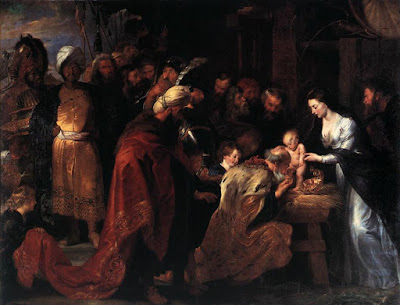I'm amazed to realize that I've never posted or discussed the Sequence hymn for Epiphany, Epiphaniam Domino canumus gloriosam. Better late than never, though! Here's a bit about the hymn, from Hymnary.org:
Here, the Martin Best Consort sings the Sequence:
Below are the words in Latin and English.
And here's the chant score, from Hymn Melodies for the whole year, from the Sarum service-books:
The Internet Archive has this 1871 book in various formats: Sequences from the Sarum Missal - and Google Books has a copy, too.
Epiphany really is one of my favorite feasts of the year; the readings during this period are so intense and potent. The background image I'm using now for this blog is of the Aurora Borealis - which seems absolutely fitting to me.
Here's a beautiful Rubens "Adoration of the Magi"; more lovely light!
Epiphaniam Domino canamus gloriosam. [Epiphany.] This Sequence occurs in a manuscript of Sequences (circa 1000) in the Bodleian Library, Oxford, No. 775, f. 140. It is also in a Winchester manuscript of the 11th century, now at Corpus Christi College, Cambridge, and an 11th century manuscript in the British Museum (Harl. 2961, f. 251 b). In the Sarum Missal it is the Sequence for the Feast of the Epiphany only. In the Hereford Missal it is appointed for the Epiphany itself, its Octave, and the Sunday in the Octave. In the York Missal it is divided into three parts: (1) "Epiphaniam Domini," (2) "Balaam de quo vaticinans," and (3) "Magi sibi stelia." The first is to be said on the Feast of the Epiphany, the second on the first day after; the third on the second day after, and so on, to the Octave, when the entire Sequence has to be sung. If however the 2nd or 3rd part should fall upon a Sunday, then it gave place to the proper Sequence for the "Translation of St. William the Archbishop," the Festival of that day. Text in reprints of the Sarum, Hereford, and York Missals, and Kehrein, No. 27. [Rev.W. A. Shoults, B. D.]
Here, the Martin Best Consort sings the Sequence:
Below are the words in Latin and English.
Epiphaniam Domino canamus gloriosam,
Qua prolem Dei vere magi adorant.
Immensam Chaldaei cujus Persaeque venerantur potentiam,
Quem cuncti prophetae praecinere venturum gentes ad salvandas.
Cujus majestas ita est inclinata, ut assumeret servi formam.
Ante saecula qui Deus et tempora, homo factus est in Maria.
Balaam de quo vaticinans, exibit ex Jacob rutilans, inquit, stella
Et confringet ducum agmina regionis Moab maxima potentia.
Huic magi munera deferunt praeclara aurum simul thus et myrrham.
Thure Deum praedicant, auro regem magnum, hominem mortalem myrrha.
In somnis hos monet angelus, ne redeant ad regem commotum propter regna.
Pavebat etenim nimium regem natum verens amittere regni jura.
Magi stella sibi micante praevia pergunt alacres itinera, patriam quae eos ducebat ad propriam linquentes Herodis mandata.
Qui perculsus corda nimia prae ira extemplo mandat, eludia magica non linquitaliter impunita, sed mox privari eos vita.
Omnis nunc caterva tinnulum laudibus jungat organi pneuma,
Mystice offerens regi regum Christo munera pretiosa,
Poscens ut per orbem regna, omnia protegat in saecula sempiterna.
Let us duly magnify
This renown'd Epiphany,
To the Child of God to-day
Wise men rightful homage pay.
Whom, immeasurably great,
Chaldee sages venerate,
To Whose coming, man to save.
All the prophets witness gave :
His majestic throne on high, —
Such His great humility, —
He refused not to forsake.
And a servant's form to take ;
God from all eternity,
Ere the world began to be,
He was man of Mary made :
Whom predicting Balaam said, —
Out of Jacob, seen from far,
There shall come a flaming star,
Which with power shall smite the host
Of Moab to his utmost coast.
Him their costly offering,
Gold, myrrh, incense, wise men bring.
God, sweet incense ; precious gold
A King 5 myrrh doth a Man unfold :
Angel-warned, no word they bring
Back to Herod, ruthless king,
Fearing much, in rage and hate,
He should lose his royal state.
Lo ! the star before them went,
Homeward on their journey bent,
Glad they seek their native land,
Heeding not the king's command.
Madden 'd with exceeding ire
Forth he sends the mandate dire
Throughout Bethlehem's coasts to seek
And to slay the infants meek.
Now the choir their voice unite.
Organs swell with mystic rite,
Bringing to the King of kings.
Praise and costly offerings.
O'er all kingdoms, o'er all lands
May He spread His sheltering hands.
Ever present to defend,
Unto worlds that never end.
And here's the chant score, from Hymn Melodies for the whole year, from the Sarum service-books:
The Internet Archive has this 1871 book in various formats: Sequences from the Sarum Missal - and Google Books has a copy, too.
Epiphany really is one of my favorite feasts of the year; the readings during this period are so intense and potent. The background image I'm using now for this blog is of the Aurora Borealis - which seems absolutely fitting to me.
Here's a beautiful Rubens "Adoration of the Magi"; more lovely light!

2 comments:
This melody is considerably older than 14th c, probably ninth century. BTW, I can be contacted offline if you would like a beautiful setting that alternates this plainchant with polyphonic music by Guillaume Du Fay.
Thanks - it does seem much older than 14th/15th c., but I got those dates from one of my sources.
Will edit this post to add your comment.
Post a Comment